- Home
- Joseph Bruchac
Killer of Enemies Page 4
Killer of Enemies Read online
Page 4
There are fifty women and girls in A Bloc. A few of them say hello or wave a hand at me. Most just ignore me, used to my indifferent silence. Aside from Guy, no one in Haven is my friend. Making friends is dangerous enough as it is without trying to befriend someone whose life expectancy—mine more than theirs—is about equal to that of a fly. Also, friends, like family, can be used as leverage against you. Better not to have any.
I reach the door to my house. My cell. I’m pleased to see it hasn’t been opened. The bicycle chain I have wrapped around the bars to keep the door shut is still doing its job, the combination lock that holds the ends of the chain still in place. Not that it would deter those in charge here. Every guard station has its own set of bolt cutters. But at least I know that none of my fellow prisoners—I mean residents—have gotten into my stuff.
I work the lock, unwind the chain, slide open the heavy door with one hand (most of the male guards take two hands to do that), go inside, slam it back shut, rewind the chain. But I don’t bother to click the combination lock shut. Nor do I settle myself down to whatever sleep is possible in this place where too many sorrowing people are caged together. Where despite the rules requiring silence after lights out, the sounds of women screaming as they wake from nightmares punctuate every night.
No way to get the meat to my family right now. It would have been great to sit and talk with them as Mom cooked some of the meat I brought back. But they had already been escorted back to their bloc by the time I got back. I was too late for when people are allowed to either go to the mess hall or cook on their own in the outdoor cooking area. No fires are allowed inside the residential blocs. But I have to eat.
I take one of the tenderloin strips from my pack and put it into my mouth. Raw meat isn’t that bad when it’s already salted and you chew it thoroughly as I’m now doing. I do have a drying rack here in my cell. I hang up the rest of the salted tenderloin I’d cut into strips before returning to Haven. Planning ahead is a requirement here—my knife is back in the armory. And I am not about to pull out either of my two hidden blades. Even when you are in your own home—cell, rather—you might still be under surveillance from peepholes in the walls.
I lay down on my cot. Rest while you can is my rule.
They will be coming for me. Probably at dawn. I close my eyes and let sleep take me.
When I open them again the first light is coming through my window. But it’s not the new day that wakened me. It’s the tingling in my palms and the thud of heavy boots down the hall. Heading my way, of course.
Four guards with green armbands. They take me through a succession of doors. Thirteen in all. Each one is clanged shut and locked behind us as we pass.
Then up one flight of stairs. We are now in the secure area at the heart of the prison.
It used to be the education wing. Now it is divided into the four separate and equally-sized areas that lodge our leaders.
Though I am only about to see one of them, an elite quartet rule here in Haven. The Ones. Two men, two women. All of them are much older than they look. Their tall bodies are perfect—aside from the disfigurement caused by the tearing out or burning out of optical and auditory enhancements. All of them are one-eyed and one-eared as a result of that. They wear masks to conceal that, but everyone knows they must be terribly scarred. However, despite their disfigurement, the gene modification that slowed and reversed their aging was unaffected by the Cloud.
That anti-aging therapy was only available to the more wealthy and powerful. Not ordinaries like me. Though none of the four are young in age, they’re beautifully shaped, as youthful and strong as idealized statues of Greek gods. Luckily for them, when the Cloud came they were only in the lower tier of the wealthy and powerful. They hadn’t yet risen to the level where they could afford the microscopic nanobots that flowed through the blood streams of the very, very few who controlled the entire planet. Those few had hundreds of enhancements meant to enable them to live forever as cyborgs. Part human, part machine, they were able to see everything, to kill with a glance, to wave a hand and bring thunder. Gods, it seemed.
And all of them met their Ragnorak when the Cloud descended.
I’m stripped down to my underwear at the next gate, something the Ones liked to do because they are rightly paranoid that their followers could turn on them. So much for my hidden weapons.
I’m escorted to stand in front of a large green door with a yellow smiley face painted in its center. Since the mouth of that face is both crooked and decorated with a pair of fangs, the effect is less than warm and fuzzy. More ironic and insane.
The largest of the four guards steps up to the door and raps on it three times.
“En-terrrrrr.”
The guard opens the door and steps aside. A rough hand is thrust against my back and I stumble over the threshold.
There, in the center of the round room, lounging crossways in a huge overstuffed chair, is the One who has summoned me. His spiky thatch sticks up straight from the top of his head like a jaybird’s crest—if jays had green hair. His long naked legs end at feet with toenails painted as green as the silk robe he has wrapped around himself. The Jester.
He swings up to his feet with a graceful turn—all of the Ones are as lithe and nimble as dancers. It ends in an exaggeratedly comic little shuffle and stomp of his feet on the wooden floor with his hands spread out like an actor in one of those long-forgotten musicals. The mask he wears is that of a green-skinned joker, face distorted in a wide grin.
I do not applaud. Unlike the four guards behind me who are clapping their hands in a well-rehearsed gesture of appreciation.
“Sooooo,” the Jester drawls. He thrusts the index finger of his right hand high above his head and the applause stops instantly.
He sweeps that upraised hand down to point at my chest. He leans forward at the waist and thrusts his long-jawed head so close to mine that I can smell his breath. Minty and rank at the same time.
His single mad green eye stares at me through a star-shaped eyehole in the mask. He straightens up and holds his hands out, palm up. A noble king bestowing a boon on an unworthy subject.
“I have a looooov-e-ly new assignment for you.”
No attagirls. No “Good job. Take a week off.”
“I’m sure you are quite deeee-lighted to hear this.”
Sardonic? Sarcastic? No, both.
I nod, keep my face as blank as a piece of slate. I’m safer if I appear too stupid to know I am being made the butt of his irony.
“Hmmmm-ummmm . . .”
His masked face moves up and down as he surveys my nearly nude body.
Pain shoots in my forehead as his thoughts crawl across me like a slug.
So stupid, yet useful, this one. Not much real intelligence, but the ability to take orders, to memorize . . . yessss, and kill. Savage little creature. One wonders what her brain might look like. Yesss.
The image that comes to me then from his slimy mind is so disgusting, so graphic that it turns my stomach. I swallow hard.
Stay in control, Lozen.
I keep my hands steady. I do not allow them to curl into claws that could rip out his throat. He might be taller and look stronger than me, but I could kill him twice before any of the three guards around him could move.
“You are to scout the western road. Twenty miles east. Clear it as needed.”
Another nod.
“You’ll see your mother and—how many?” He turns to the guard nearest him who quickly holds out one index finger on each hand. “Your two siblings, when you return from your scout.”
Nod number four. And a small feeling of relief at this minimal reassurance that my family has been taken into tighter custody for the simple purpose of putting more pressure on me.
“Tooo-mor-rrr-ow, tooo-morr-row,” he croons. “Now goooo.”
A dismissive wave of his hand as he turns his back.
That’s it. Interview done.
I nod again, begin to start
toward the door.
“One more thing,” the Jester’s voice stops me halfway through my turn. He is posed in front of his chair, bent to the side with his arms out, one palm facing the ceiling, the other almost touching the floor. He cocks his head in clear expectation of a verbal reply.
“Yes,” I say. It’s the first word I’ve spoken since being ushered into his chambers.
He nods, straightens and puts his hands on his hips.
“Do have fun!”
CHAPTER SIX
On the Road
The highway west. Great. Now I know where I am going to die.
As I am escorted down through the thirteenth door, I look calm. But my heart is thudding so hard and fast in my chest that I feel like a walking drum.
Despite the defunct motor vehicles that have littered the interstate highways since the day the Cloud arrived, those roads are still passable, especially by a light, human-powered machine. Bicycles—the one form of wheeled transportation unaffected by the Cloud. But bikes and broad highways are no longer being used around Haven.
Why are we no longer using bikes? And why do we not use the highways instead of traveling on foot on the narrow trails over the hills and through the mountain forests?
It’s because the people who ran errands for the Ones on bikes along those highways never came back. It seems there were certain problems about bikes and highways.
Problem Numero Uno was visibility. A person on a road on a bike is highly visible, especially here in the Southwest where the roads go on for miles without hardly a bend. Visible to enemies.
Problem Numero Dos, especially along the highway west, was the Birds. Birds with a capital B for big. As big, I suppose, as the Monster Birds that were wiped out in the time of our First People by Killer of Enemies and his brother Child of Water. My target on this trip, though the Jester never said it aloud, is to neutralize that threat.
As I leave the main building and cross the courtyard, the warm morning sun touches my face. That same sun on hot, dark pavement causes thermals, masses of heated air that rise high into the sky. That’s why large flying creatures such as vultures and eagles—and their even bigger mutated cousins—have a special fondness for roads. Those thermals help wide wings stay aloft.
Those monster birds also seemed to be especially attracted to bicycles. Maybe it was something about the sound of the wheels on the road or the gentle noise of the pedals being worked. Whatever the reason, getting on a bicycle anywhere outside of Haven was an invitation to, so to speak, come fly with me.
The rocks far below the high cliff where they nest are said to be littered with broken human skeletons and smashed bicycle parts.
How do you kill a creature that can just fly out of reach of your weapons—a creature that is as big as a plane?
I’ve barely managed to calm my breathing by the time I reach the armory door. Guy is standing there. Even though it is just after sunrise, he’s already waiting for me. As usual, he got the word about my assignment. I say a silent prayer of thanks once again that he is on my side.
He’s smiling as he holds out something no bigger than a medium-sized backpack.
“A wee present for you, lass.”
“You’re kidding,” I say. I take it in my hands and heft it. The words ACE BASE JUMP SPECIAL are stitched on it in red thread.
“Strap it on tight,” he says. He taps the looped cord near the bottom. “This is what you pull.”
“How old is this?”
“Like new, lass. The chute is made of the finest neo-silk. I know it well, having been a paratrooper meself. Plus I spent a good hour before dawn repacking it. Should work well.” He chuckles. “If not, just ask for your money back.”
“Hah.”
Of course that is not all he has for me. From his seemingly endless collection of combat gear—just about all of it no longer replicable with what technology is left to us, but all of it still carrying a lifetime (ho-ho) guarantee—he has amassed a rather sizable pile of items for me.
Numero Uno, close to my skin, a layer of body armor. It weighs less than a medium-sized book, is soft and flexible to the touch, but harder than carbon steel when something tries to pierce it at any velocity faster than a gentle nudge. It is so light, conforming to me like a second skin, that I’ll hardly feel as if I am wearing it.
As I slip it on, Guy starts a little monologue, reviewing what we both already know.
“Our big feathered friends are hard to kill. Bullets seem to bounce off.”
I nod. I remember the story that the two surviving scouts told about their encounter. They emptied their AK-47s at the attacking birds. Even panicked as they were, some of those rounds must have hit home. No effect. Although I would bet my life—and probably am betting my life—that they missed my favorite targets, the eyes.
Numero Dos, Guy puts into my hands what looks like an old-fashioned hoodie made of that same deceptively strong material. When I pull it up the vulnerable back of my neck is protected. The only part left uncovered is my face after I’ve put it on.
“We also know,” Guy continues, “their preferred method of dispatching their prey. Grab, peck, fly high, and drop.”
Another nod. The two survivors, who’d taken refuge in a narrow cave, had watched in horror as their four comrades were dispatched. Sharp piercing claws were wrapped around their screaming bodies, scimitar beaks stabbed at the backs of their necks, then they were taken for one final ride up a few thousand feet before being dropped. I suppress a shudder.
I’m all dressed save for one final thing. Guy’s wee present. He helps me fasten the Base Jump Special to the front of my body, double checks the straps.
“Now,” he says. “Weaponry.”
No rifles. Too cumbersome, and no more effective at close range than the handguns I’m taking with me. My favorite .357 and one other smaller sidearm, a Glock, for back-up. Both loaded. The Glock with only twelve rounds rather than the thirteen possible with one in the chamber. Glocks don’t have safeties, so it’s better to jack one into the chamber just before you’re ready for action. Carefully counted out additional rounds for the .357 and two spare clips for the Glock. My trusty Bowie knife and three other blades of various shapes and sizes. Then one last thing, which looks like one of those billy clubs that policemen (another extinct species) used to carry.
“Watch this, lass.”
Guy twists the handle and it elongates, each section clicking tightly into place, into a six-foot staff.
“And this.”
He presses a red dot on the handle. A foot-long, razor-sharp, double-edged blade emerges from the end.
“Here.” I say.
Guy slaps it into my hand. I press the dot with my thumb, collapse it. Press the button, open it again. Smooth and easy. Once, twice, three times. Try to bend it when fully extended. Nope, light as it is, it’s as unyielding as steel. I stab its blade against the concrete wall of the weapon shed. The blade doesn’t bend or break, but it does gouge out a piece of the wall.
“Sold,” I say, as I collapse it back down and slip it into the sheath that will attach to my belt, securing the Velcro strap that will hold it in place.
“Ready?” Guy asks.
“Born ready,” I reply.
It’s a corny thing to say, I know. But it’s become a mantra for us every time I head out on one of my suicidal assignments.
Guy slaps me on the shoulder, hard enough for that palmsized section of my body armor to stiffen to absorb the blow. It’s not any power source that causes that, just the sudden shock of impact that makes the molecular structure alter to absorb the blow. Something to do with surface tension.
But he’s not done. He holds up a hand, gesturing for me to wait. He disappears into the back of the armory and comes back out with one final thing that he wheels up to me. I bite my lip at the sight of it. I’d been expecting it, but it reminds me that I am setting out on this errand as a human decoy. I’m both the goat tied to a stake to lure in the tiger and the hunt
er.
“Crap,” I say, letting my breath out as I do so.
“Nah,” Guy replies. “It’s a fine machine. Now just try to bring it back in one piece.”
What about bringing me back in one piece? I think. But I don’t say it. I grab the handlebars of one of the last surviving trail bikes on the continent and start to push it out the door.
“May the road rise up to greet you and keep you safe, lass,” Guy says to my back.
I don’t turn around. I just nod and keep going.
I’ve been pedaling for most of the morning along the western road. Haven is far behind me now. I’ve only paused once. That was perhaps an hour ago when I stopped to survey the peaks, which were looming closer. I’d also taken the time to eat some of the venison jerky Guy had packed for me and drink from one of my canteens.
It’s a beautiful day. Or so some would say. The only clouds in the sky are those that hover around the further peaks. I look up in fascination at the clouds. Our family is mixed. There is Navajo and Pueblo in us, too. Dad told me that the old people, our Pueblo ancestors, believed those clouds were beings who lived there in the shape of rain clouds. When those old people sang and danced in the right way, at the time of spring planting, those sacred and powerful beings would return to the skies overhead and bring the rain.
My thought about it, though, is that on a clear day like this in the desert when you can see for a hundred miles or more, you can be seen from just as far away. A little shiver goes down my back—and it is not from feeling cold. Something, somewhere, with far better eyesight than mine is watching me.
I think about being Apache, about how it inspires me to be brave. I think about that heritage even more because of my namesake, about being a warrior woman in our old way like Lozen was. And with those thoughts, my hidden doubts come back like dark shadows to haunt me. I’m not afraid of dying. Well, not that afraid. But I do fear failing. I find myself wondering once again about whether I’ll be able to live up to that responsibility, that legacy.

 Peacemaker
Peacemaker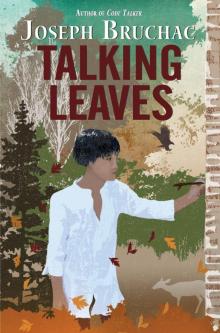 Talking Leaves
Talking Leaves Found
Found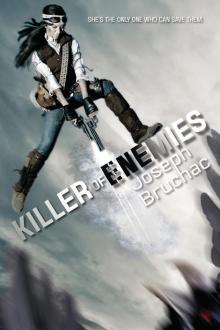 Killer of Enemies
Killer of Enemies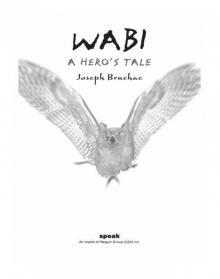 Wabi
Wabi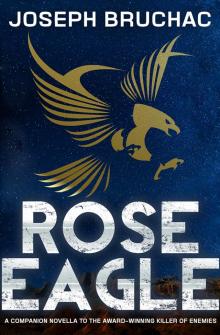 Rose Eagle
Rose Eagle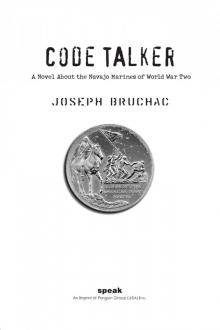 Code Talker
Code Talker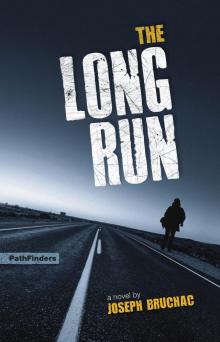 The Long Run
The Long Run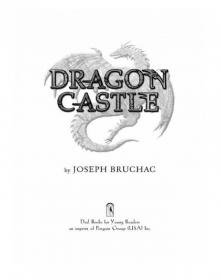 Dragon Castle
Dragon Castle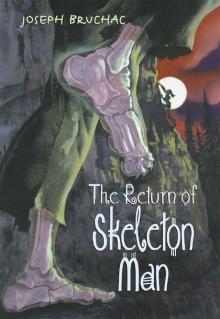 The Return of Skeleton Man
The Return of Skeleton Man Pocahontas
Pocahontas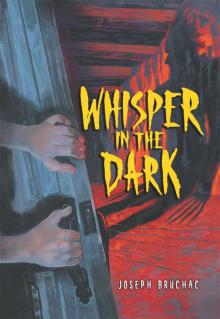 Whisper in the Dark
Whisper in the Dark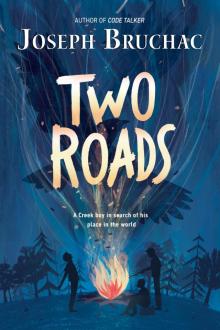 Two Roads
Two Roads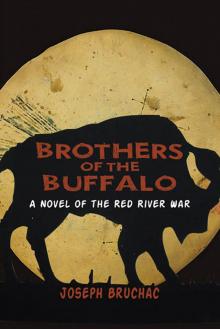 Brothers of the Buffalo
Brothers of the Buffalo The Warriors
The Warriors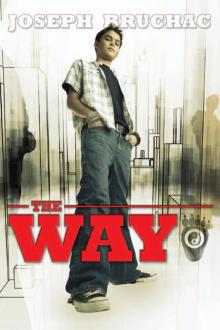 The Way
The Way Sacajawea
Sacajawea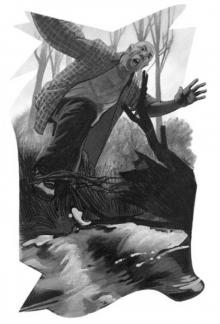 Night Wings
Night Wings March Toward the Thunder
March Toward the Thunder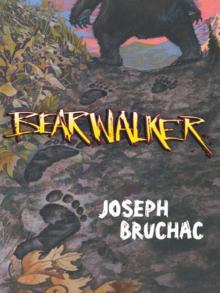 Bearwalker
Bearwalker Skeleton Man
Skeleton Man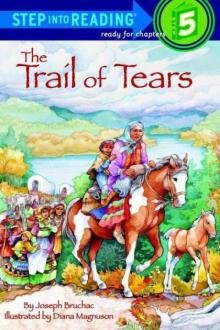 The Trail of Tears
The Trail of Tears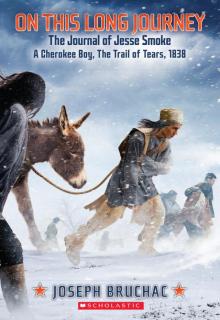 On This Long Journey
On This Long Journey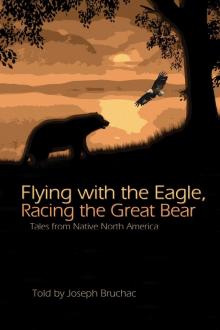 Flying with the Eagle, Racing the Great Bear
Flying with the Eagle, Racing the Great Bear